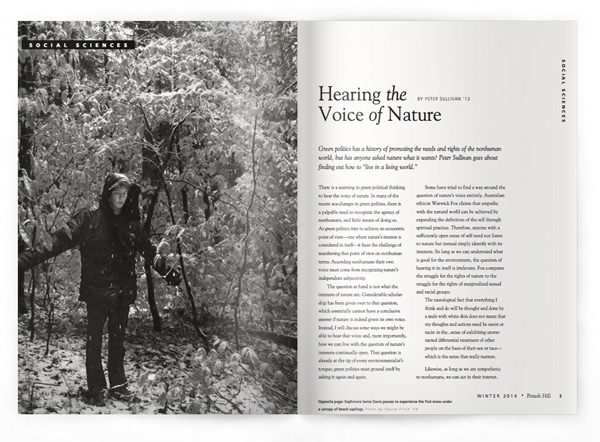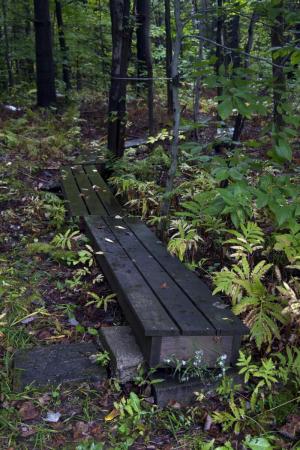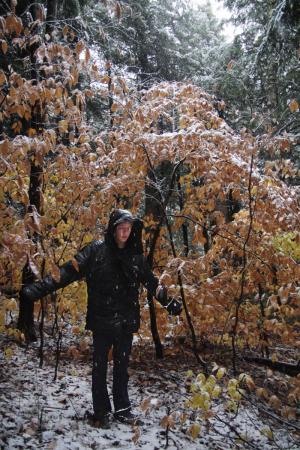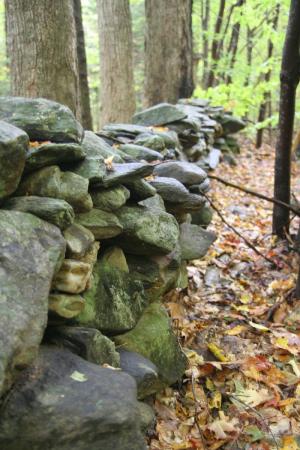Hearing the Voice of Nature

By Peter Sullivan ‘13
Green politics has a history of promoting the needs and rights of the nonhuman world, but has anyone asked nature what it wants? Peter Sullivan goes about finding out how to “live in a living world.”

There is a yearning in green political thinking to hear the voice of nature. In many of the recent sea-changes in green politics, there is a palpable need to recognize the agency of nonhumans, and little means of doing so. As green politics tries to achieve an ecocentric point of view—one where nature’s interest is considered in itself—it faces the challenge of manifesting that point of view on nonhuman terms. According nonhumans their own voice must come from recognizing nature’s independent subjectivity.
The question at hand is not what the interests of nature are. Considerable scholarship has been given over to that question, which essentially cannot have a conclusive answer if nature is indeed given its own voice. Instead, I will discuss some ways we might be able to hear that voice and, more importantly, how we can live with the question of nature’s interests continually open. That question is already at the tip of every environmentalist’s tongue; green politics must ground itself by asking it again and again.
Some have tried to find a way around the question of nature’s voice entirely. Australian ethicist Warwick Fox claims that empathy with the natural world can be achieved by expanding the definition of the self through spiritual practice. Therefore, anyone with a sufficiently open sense of self need not listen to nature but instead simply identify with its interests. So long as we can understand what is good for the environment, the question of hearing it in itself is irrelevant. Fox compares the struggle for the rights of nature to the struggle for the rights of marginalized sexual and racial groups:
“The tautological fact that everything I think and do will be thought and done by a male with white skin does not mean that my thoughts and actions need be sexist or racist in the…sense of exhibiting unwar- ranted differential treatment of other people on the basis of their sex or race—which is the sense that really matters.”
Likewise, as long as we are sympathetic to nonhumans, we can act in their interest. This is not untrue on its face. However, Fox overlooks an important element in other struggles for legitimacy: the element of self-representation. The women’s movement needed a women’s literature, and the legitimization of American black identity has been founded on its retreat and independent formation. In the same way, “what is good for the environment” must be answered, at least in part, by the environment itself. An ecocentrism lacking this element of self-representation merely speaks for a “nature” that is actually removed from nature, much as some American mid-20th-century Marxists spoke on behalf of “the people” while neglecting what the working class itself had to say.
The question “What does the natural environment have to say?” has previously been answered by particular characterizations of the environment: the conservationists’ untamed wilderness, species preservationists’ focus on specific press-friendly animals, the Romantics’ sublime Nature. Today these characterizations are accomplished more hesitantly and partially in nature writing and documentaries, and in the adoption (sometimes appropriation) of a variety of animistic religions. The hesitancy may perhaps result from greater awareness that the very practice is under question. Appropriating any one of these characterizations, these myths of nature, as nature’s one true voice is no better than characterizing nature as devoid of any value beyond being a resource. Ecocentrism demands that we look to the territory, not the map: to characterize the natural environment at all is to objectify it, and even the trendiest, most self-conscious characterization is only another way to assign values to resources. Nature does not need to be “valued” (valuated): it needs to be liberated from its status as a human product and project. Our knowledge of the environment must come from its own accounts and the many ways it reveals itself to us.

The question therefore changes slightly: “How can we listen when the natural environment speaks?” Derrick Jensen, the environmental activist, critic, and author of A Language Older Than Words, shows that this listening is very important indeed. He proposes an animate world that humans systematically ignore:
“As is true for most children, when I was young I heard the world speak. Stars sang. Stones had preferences. Trees had bad days. Toads held lively discussions, crowed over a good day’s catch. Like static on a radio, schooling and other forms of socialization began to inter fere with my perception of the animate world, and for a number of years I almost believed that only humans spoke…. This silencing is central to the workings of our culture. The staunch refusal to hear the voices of those we exploit is crucial to our domination of them.”
Our ability to commit atrocities against nature is predicated on our ability to silence non-human voices. For Jensen, an environmentalist ethic is waiting for us if we can only listen. He insists that this listening is not at all metaphorical. For means of hearing the environment, he offers anecdotes from his life: stars comforting him as a child, a tree contradicting an opinion he expressed only in a thought, mice demanding he leave a place for them in his home. Once we learn to notice these, our path of action will be clear.
I cannot corroborate these anecdotes myself—I might offer instead a childhood fear of dark closets, a social self-education facilitated by building houses with Legos, and a still-persisting habit of scolding soap-slickened dishes when I fumble and drop them. My world speaks in the mechanics and aesthetics of designed things. When I go into the wilderness I don’t hear voices, I get bored. Those who have heard the wilderness speak to them in words will find their nonhuman ethics there; those who have not must look elsewhere.
Australian ecofeminist Val Plumwood offers us a radically different model of environment-as-agent: also anecdotal, but more easily translated to universals and better connected to everyday life as we understand it. To her, we can access a natural perspective in events that disrupt what she refers to as “the narrative self.” When the narrative thread of identity becomes impossible to sustain, a more basic consciousness, perhaps shared with animals who have no evolutionary need for identity, predominates.
Plumwood encountered this consciousness while suffering a nearly fatal crocodile attack: “I glimpsed the world for the first time ‘from the outside,’ as a world no longer my own, an unrecognizable bleak landscape composed of raw necessity, indifferent to my life or death.” In these extreme moments when we participate in interactions common to all animals but that human culture cannot reach, we encounter something like an authentic commonality with these animals. These encounters, she suggests, can tell us how to live in a world with animals (and in which we are ourselves animals). Coming away from her own encounter of nearly being eaten, she is able to suggest a universal judgment about the rights of animals: “Reflection has persuaded me that not just humans but any creature can make the…claim to be more than just food. We are edible, but we are also much more than edible.”

Despite the unlikelihood of your average ecocentrist being attacked by a crocodile, Plumwood’s view is actually more realistic about our prospects for understanding the natural environment on its own terms. Insofar as we understand the nonhuman as something foundational to culture, which is in turn covered up by culture, the natural is already tacitly present but can only be brought to the foreground in the most extreme traumatic breaches of culture. This suggests a sort of prophetic source for nature’s voice. But we should not let others’ prophecies strictly determine our own ideas. The importance of hearing the environment speak, we should remind ourselves, is not to find the correct ways to characterize (and thereby objectify) it, but to hear its own accounts and accord to them legitimacy in themselves.
As green political rhetoric shifts focus to large-scale crises (such as climate change and peak oil) instead of specific grievances as in the species-conservation efforts of the 1990s, it faces the challenge of motivating people at a personal level. Reports of the ongoing apocalypse ask us to gaze with fear upon exponential curves and charts of changing sea ice albedos. Understandably, few feel up to the challenge of saving humanity or the earth. The individual connection to nature—the personal grounding of environmentalism—has nearly disappeared from this rhetoric. Hearing the voice of nature can help environmentalists reestablish our connection to the more-than-human world.
While Derrick Jensen tells us that nonhumans have a voice, and that listening to it is the ground of an environmental ethic, Val Plumwood tells us that hearing that voice comes only on occasion, and usually on occasions somewhat removed from our everyday lives. Yet, to even begin to act on behalf of nonhuman nature or to respond to its needs, we must have means of interrogating, controlling, and re-forming the places we live and the ways we support ourselves—our material interventions in the world. Until then, the voice of nature may only be heard by the few die-hard ecocentrists dedicated enough to listen to trees and stones or consort with crocodiles.
Peter Sullivan graduated in May with a Plan of Concentration in politics and environmental studies. This article is excerpted from his Plan paper titled “How to Live in a Living World: Green Politics and the Voice of Nature.” He is now living in West Brattleboro with a fellow graduate, a neurotic cat, and a long-neglected copy of Spinoza’s Ethics.
Defining a practical land ethic
 “The growing drive to change our relationship with the nonhuman
environment is wrought with internal conflict and debate about which
tactics are the most ethical and whether those are the most efficient,”
said senior Ayla Mullen. She is doing her Plan of Concentration in
environmental political thought and ceramics, specifically looking for
solutions to actualizing a new environmental ethic that includes the rights of nonhumans. Drawing from the work of Aldo Leopold, John Locke, Val Plumwood, Hannah Arendt, and Wendell Berry, Ayla is charting a more comprehensive approach. “When these authors are brought to conversation with each other, they propose what I see as a compelling normative argument for a practical land ethic—based in both a critical understanding of one’s interdependence with the ecological community and a vital, embodied, action-based relation to the land.”
“The growing drive to change our relationship with the nonhuman
environment is wrought with internal conflict and debate about which
tactics are the most ethical and whether those are the most efficient,”
said senior Ayla Mullen. She is doing her Plan of Concentration in
environmental political thought and ceramics, specifically looking for
solutions to actualizing a new environmental ethic that includes the rights of nonhumans. Drawing from the work of Aldo Leopold, John Locke, Val Plumwood, Hannah Arendt, and Wendell Berry, Ayla is charting a more comprehensive approach. “When these authors are brought to conversation with each other, they propose what I see as a compelling normative argument for a practical land ethic—based in both a critical understanding of one’s interdependence with the ecological community and a vital, embodied, action-based relation to the land.”
